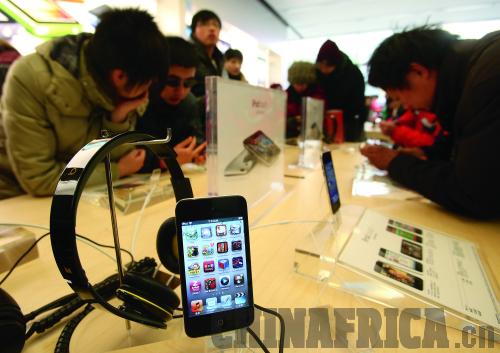|
 |
|
IN DEMAND: Apple is China's new sweetheart when it comes to mobile products |
In September 2010, an Apple Store in Beijing attempted to lift its two-per-customer limit on sales of the iPhone 4. The restriction was not exactly popular with Chinese buyers eager to snap up the smartphone, but getting rid of the rule caused more problems than it solved. Fighting broke out, and the store was forced to implement an even tighter constraint: one phone per customer.
That same month, the iPad had its official release in China. Over the next year, sales of the tablet skyrocketed. When its second generation, the iPad 2, hit stores this past May it sold out in four hours. China's fever for Apple products extends beyonds just gadgets, though. The country is now the second largest market for the Apple App Store, according to Distimo, a Dutch company that tracks mobile app stores worldwide. Only the United States leads China in terms of app download numbers.
"Such is the undeniable appeal of a device whose minimal hardware disappears and, in the form of an app, becomes anything its owner wants," writes Brian X. Chen in Always On: How the iPhone Unlocked the Anything-Anytime-Anywhere Future – and Locked Us In. Chen's book documents how smartphones have made technology "cool" for mainstream consumers. The concept of hardware is no longer such a mystery, and stiff terminology like "software application" has been casually rechristened as "app." And apps, Chen argues, are changing how people live both online and off. They're not only cool, they will soon be indispensible.
In China, the possibility of never-ending reliance on smartphones is significant. After all, the country has nearly 1 billion mobile users.
Realities
For all the attention Apple gets in China, its reach is still quite small. Data published earlier this fall by the Chinese internet company NetEase Tech shows that only 18 percent of the country's 930 million mobile users work off of Apple's iOS system.
One person immersed in the iOS trenches is Sun Li. He works at China iDigest, a magazine – or rather, "appgazine" – published solely for the iPad. "Chinese people treat Apple products as luxuries," he says of country's craze over the sleek devices. "It speaks to the quality of the products."
Sun has a keen interest in mobile technology. Tablets like the iPad, he says, "represent the latest in technology and where things are heading in the future." Sun owns a Wifi-equipped iPod Touch (in addition to a Samsung phone), and considers the device a good companion – in gridlock. "In big cities like Beijing and Shanghai, people spend a lot of time sitting in traffic," he explains matter-of-factly. "[Mobile] apps give them something to do – read, have fun – help them to avoid wasting their time. They help people to live better lives."
Sun's app of choice is Sina Weibo, the Chinese microblog behemoth. He's also a frequent user of QQ IM, an instant messenger service. E-readers and games round out his mobile applications folder.
Sun's app habits echo those of most Chinese mobile phone users. A list of the top 10 apps compiled this past spring by TechRice, a China-focused technology blog, had QQ IM ranked as number one for the iPhone. Sina Weibo was somewhat further down the list at number nine. Games like Plants vs. Zombies, Fruit Ninja, Angry Birds and Talking Tom Cat otherwise dominated.
Whether apps are truly improving Chinese lives yet is up for debate. At least they make for a more entertained existence.
|